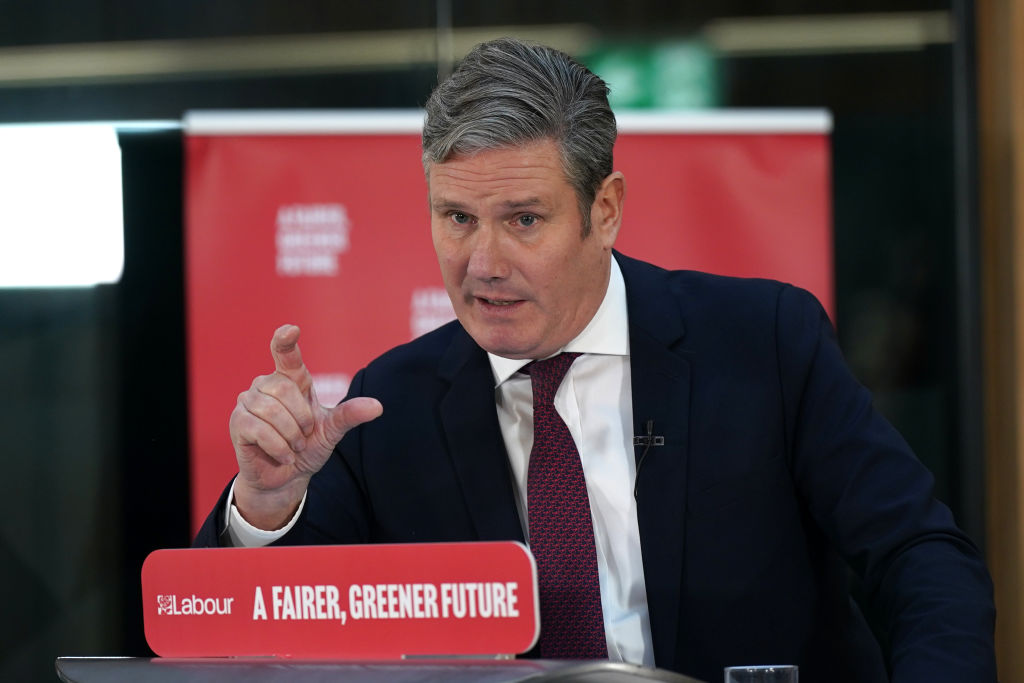On the day he unveiled Gordon Brown’s 153-page report into renewing Britain’s democracy Keir Starmer showed his steely side and helped us better understand the evolving character of ‘Starmerism’.
Up till now, when asked what they think about the Labour leader, many voters, after scratching their heads, have said something like: ‘boring’, ‘dull’ and ‘bland’. These are tags that have plagued Starmer ever since his election as leader. Indeed, over the summer Starmer even had to order his own Shadow Cabinet to stop briefing journalists about how boring he is.
As Rishi Sunak is discovering, it is hard to demonise someone widely seen as boring
The reality behind the bland persona is however very different: for both in terms of party management and policy Starmer is, when it comes to the pursuit of power, much more brutal than boring.
Starmer’s rise has been remarkable considering that he only became an MP in 2015, the year Jeremy Corbyn – whose politics the soft left Starmer had little time for – was elected leader. Yet Starmer immediately joined Corbyn’s shadow ministerial team, before resigning in 2016 as part of an attempt to unseat his leader. That coup having failed, Starmer was promoted to Shadow Brexit Minister, where he endorsed Corbyn’s 2017 election manifesto which confirmed Labour’s acceptance of the Brexit referendum result and support for the end of free movement. His position shifted when it became clear this was a position deeply unpopular with Labour members who mostly voted Remain and by 2018 Starmer had become a leading advocate of holding a second referendum, much to Corbyn’s irritation.
Starmer’s 2020 campaign to become leader pitched him as a sensible Corbynite. He avoided direct criticism of Corbyn; he even issued ten pledges designed to win over members who admired Corbynism but despaired of Corbyn’s incompetence. Since then, some of Starmer’s positions have shifted as he has addressed the pressing need to win back voters for whom Corbyn was anathema. In particular, Labour has re-embraced Brexit – although now the public are increasingly critical of the deal negotiated by Boris Johnson, Starmer has suggested that some modifications to the deal are needed.
As Rishi Sunak is discovering, it is hard to demonise someone widely seen as boring. At Prime Minister’s Questions Sunak has tried his best to suggest Starmer cannot be trusted due to his previous support for Corbyn. That Starmer will be standing a Labour candidate against the ex-leader at the next election rather undercuts that point. Similarly, Starmer’s hard line on supporting Brexit makes it hard for Sunak to land any punches over his previous status as a Remainer. The Labour leader’s refusal to support striking workers also has closed down what would once have been a profitable Conservative line of attack.
Not only has Starmer reduced Labour’s vulnerability, he has ensured that almost everything the party says now directly relates to the pressing cost of living concerns of voters. Even the Brown report into revitalising British democracy – long a concern of the left – was couched in terms of its contribution to helping the economy grow especially in the long-neglected former Red Wall.
Some in his party, however, believe however Starmer needs to inspire voters if Labour is to turn its 20-point poll lead into election winning votes at the general election. Certainly there are some voters who still need more of a vision from Labour, and the promise of a ‘New Britain’ contained in Brown’s wide-ranging report on how the party might shift power from Westminster has the potential to do that. The promise of a better future has always been central to successful Labour general election campaigns, be it in 1945, 1964 or 1997. But these campaigns were all also underpinned by basic hard-nosed material arguments and directly addressed the immediate concerns of the British people rather than the ultimate desires of Labour members.
Starmer clearly appreciates that truism and his brutal pursuit of power suggests he will do and say what it takes to become prime minister. As he was reported as saying in June: ‘What’s boring is being in opposition’.






Comments